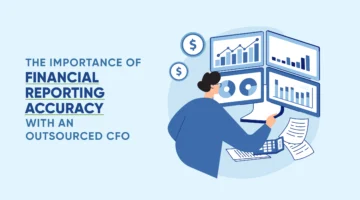The Importance of Cloud Computing in Finance
What is Cloud Computing in Finance?
Cloud computing has emerged as a transformative force in finance, reshaping how financial services are delivered and managed. Today more than 90% of all business enterprises use cloud computing in some way. The relevance of cloud computing stems from its ability to handle the enormous data volumes generated daily. Financial institutions, from banks to investment firms, generate petabytes (1,000 terabytes/1,000,000 gigabytes) of data, including transaction records, customer information, and market data. Properly managing this data is crucial for operational success and regulatory compliance.
This article will discuss the integral role cloud computing plays in the finance sector, exploring its many benefits, challenges, and emerging trends shaping its future. From enhancing operational efficiencies to navigating the complexities of data security, cloud computing stands at the forefront of financial innovation.
The Benefits of Cloud Computing in Finance
Integrating cloud computing in finance has dramatically increased efficiency, which results in various benefits that are reshaping the industry. The following benefits collectively allow for innovation, enabling financial institutions to thrive in a digitally driven marketplace:
- Cost Efficiency: Cloud computing significantly reduces IT infrastructure costs. Financial institutions can avoid expenses related to purchasing, maintaining, and upgrading physical servers. The pay-as-you-go model of cloud services means firms only pay for what they use, which can lead to substantial cost savings.
- Enhanced Security and Compliance: Security is paramount in finance. Cloud providers typically offer robust security features that are often more sophisticated than what individual firms can achieve. Moreover, they ensure compliance with various financial regulations, updating their systems as laws and standards change.
- Scalability and Flexibility: Cloud computing offers unmatched scalability and flexibility. It allows firms to quickly scale up or down based on their needs, a crucial feature for managing varying workloads and business growth.
- Improved Accessibility and Collaboration: With cloud computing, financial data and applications can be accessed from anywhere, facilitating remote work and collaboration among teams across different geographies.
- Data Backup and Disaster Recovery: Cloud computing enhances data backup and disaster recovery capabilities. Data stored in the cloud can be easily backed up and restored, which is crucial for business continuity during unplanned events.
Challenges and Solutions
While cloud computing offers many benefits to the finance sector, it is still challenging. The following are examples of challenges with cloud computing and their solutions:
1. Data Migration Complexities: Moving existing data from on-premises servers to the cloud can be daunting. This process involves transferring large volumes of sensitive financial data securely and efficiently without disrupting ongoing operations.
Implementing a phased migration approach can help with this problem. Begin by migrating less critical data and gradually move to more critical data, ensuring each step is successful before proceeding.
2. Need for Skilled Personnel: The shift to cloud computing requires specific skills and knowledge that existing IT staff may not possess. This includes managing cloud infrastructure and understanding cloud-specific security protocols. By investing in training and development, you can train your staff to upskill their abilities in cloud technologies. Alternatively, you could hire or augment your staff with cloud computing experts.
3. Data Sovereignty and Privacy Concerns: Storing data in the cloud raises issues about data sovereignty, as data stored in foreign servers may be subject to different laws. Privacy concerns also arise regarding how data is managed and protected.
Be sure to choose the right cloud service provider. Opt for providers that comply with local data protection laws and implement robust encryption.
4. Vendor Dependence: Relying heavily on a single cloud provider can lead to risks if the provider experiences issues or changes their terms of service. This dependence can limit flexibility and bargaining power.
Adopt a multi-cloud strategy to avoid this issue. Using services from multiple providers can reduce dependence and increase flexibility.
5. Security Risks: Storing sensitive financial data in the cloud can expose it to cyber threats, requiring stringent security measures to protect against breaches and unauthorized access.
Prioritize your security measures to ensure strong security protocols to safeguard your information. Be sure to conduct regular security audits as well.
6. Regulatory Compliance: Financial institutions must comply with various data protection and privacy regulations. Ensuring cloud services meet these regulations is essential.
Continuously monitor any regulatory changes to ensure compliance with cloud solutions.
7. Integration with Existing Systems: Cloud solutions with existing on-premises systems can be complex, requiring compatibility and seamless data exchange between different technologies.
Middleware or custom APIs can bridge gaps between cloud applications and legacy systems.
8. Challenge: Managing Costs: While cloud computing can be cost-effective, unmanaged cloud usage can spiral costs, especially if resources are over-provisioned or underutilized.
Regularly review your cloud resources and employ cost management tools to keep usage in check.
Future Trends
Several trends are poised to impact the future of cloud computing in finance significantly, driving the sector’s evolution and introducing new challenges and opportunities. The following developments will shape how financial services leverage cloud technology for greater efficiency and innovation:
- Increased Adoption of Hybrid Cloud: Hybrid cloud environments, combining private and public clouds, are expected to become more popular. They will offer a balance of security, compliance, and scalability.
- AI and Machine Learning Integration: Integration of AI and machine learning with cloud computing is anticipated to grow. These technologies can analyze vast amounts of financial data for insights, automate routine tasks, and enhance decision-making.
- Blockchain in the Cloud: Integrating blockchain technology with cloud computing is emerging as a trend. This combination can enhance security and transparency in financial transactions.
- Sustainability and Green Computing: As environmental concerns gain prominence, sustainable cloud computing practices will become crucial. This includes using energy-efficient data centers and renewable energy sources.
Cloud computing is becoming an indispensable part of the finance sector, offering numerous benefits while posing certain challenges. As we move forward, the landscape of cloud computing in finance will continue to evolve, driven by technological advancements and changing market dynamics. Keeping pace with these changes will be vital for financial institutions seeking to harness the full potential of cloud computing.
Do you think you may need help integrating cloud computing into your finances? Contact a NOW CFO consultant for more information.
Get Your Free Consultation
Gain Financial Visibility Into Your Business
We provide outsourced CFO, fractional CFO, and temporary CFO, Controller, and operational Accounting services that suit the needs of your business.
- Hourly Rates
- No Hidden Fees
- No Long Term Requirements
NOW CFO provides the highest level of expertise in finance and operational accounting to accelerate results and achieve strategic objectives for sustainable growth and success.
After completing the form, a NOW CFO Account Executive will reach out and learn more about your needs so that we can pair you with the right Partner.
Learn More: CFOs in Digital Finance



